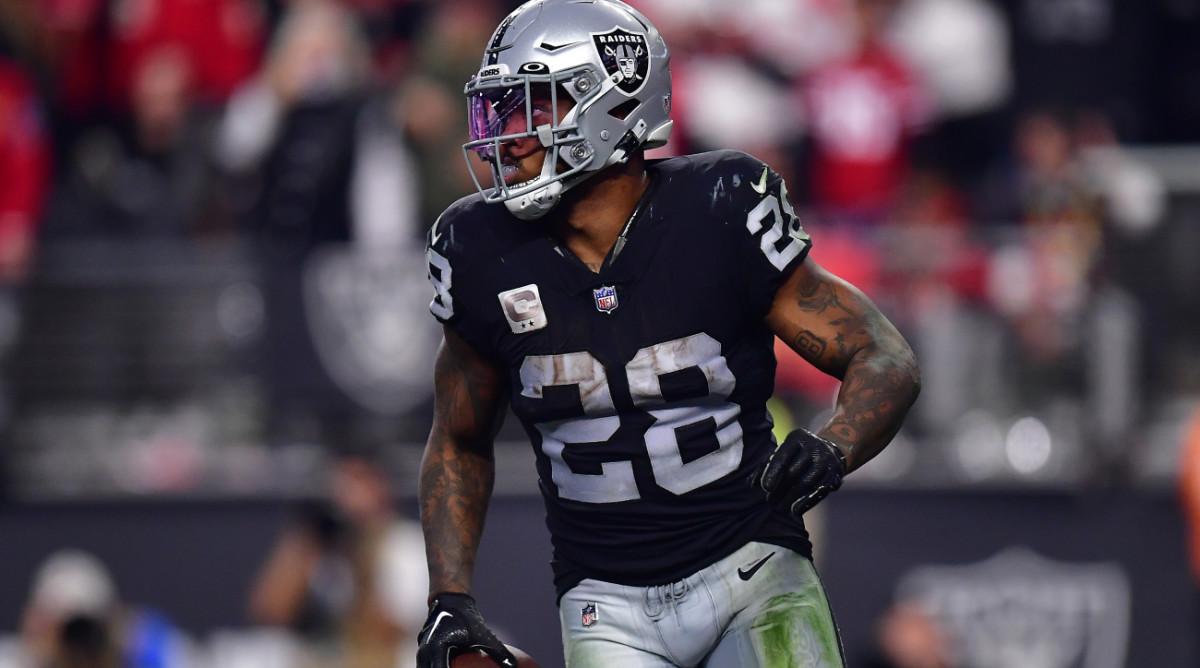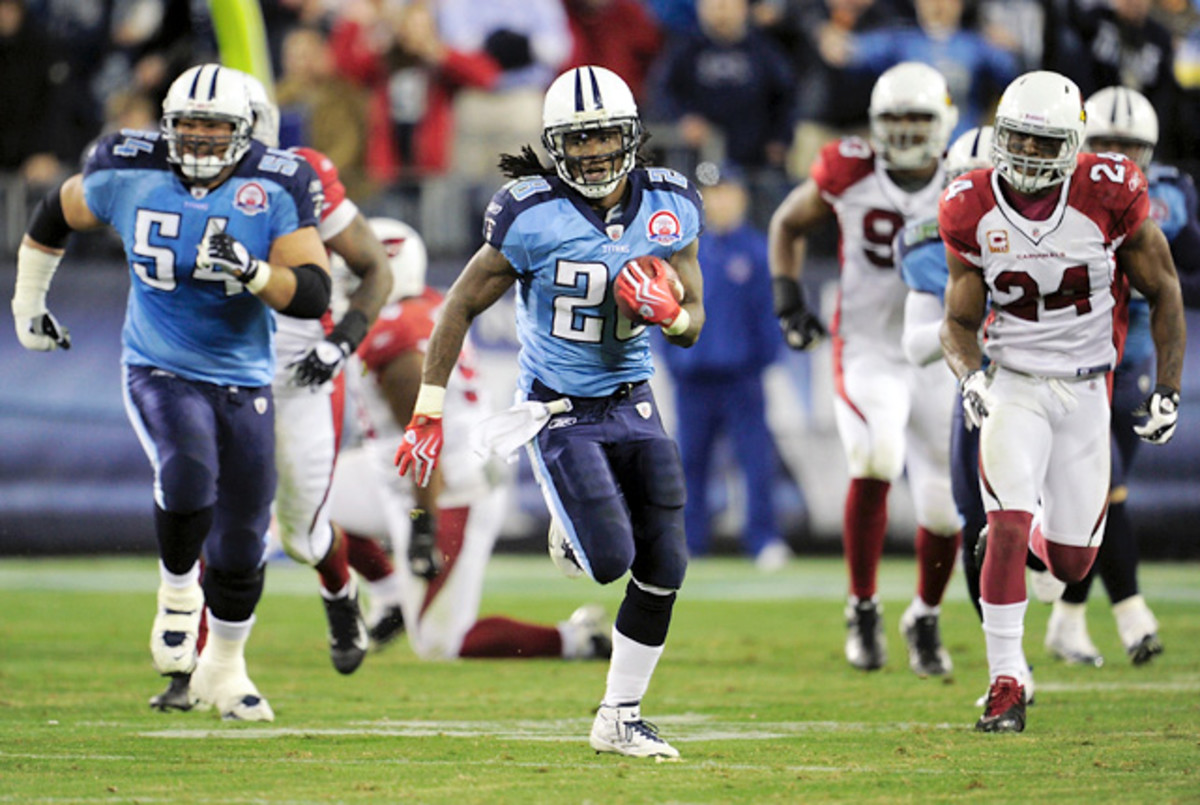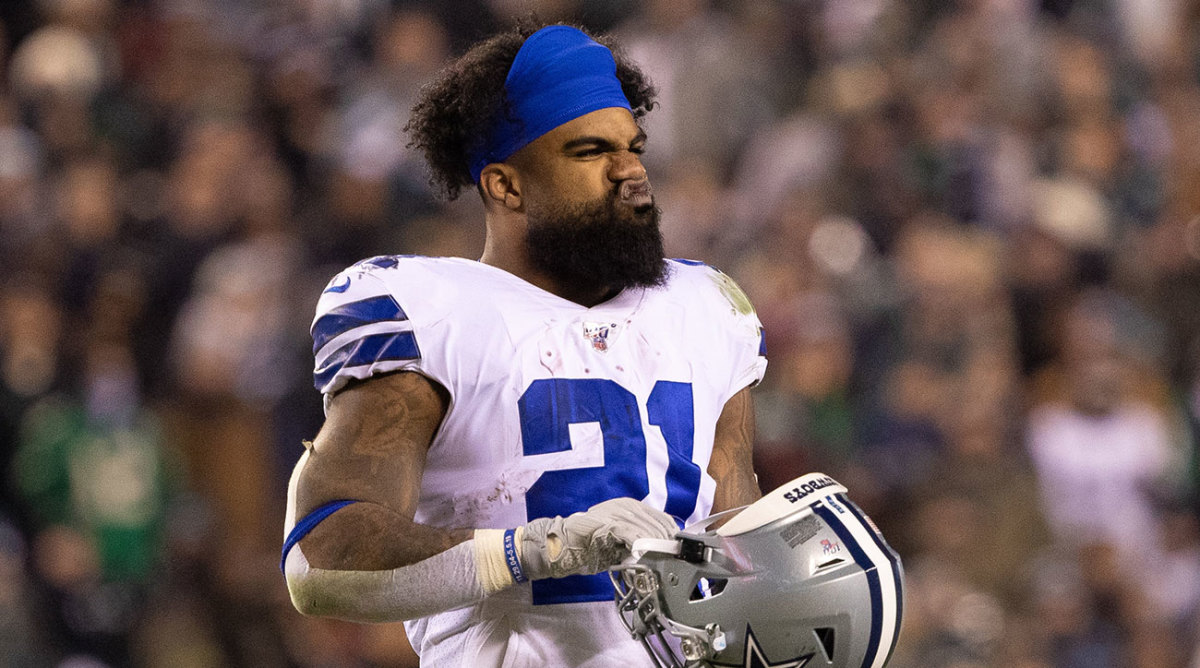Now That Saquon Barkley Has Signed, Here’s How a Holdout Might Affect Josh Jacobs’s Fantasy Value
The running back position has become the proverbial black sheep of the National Football League, at least as it pertains to getting paid. NFL teams simply don’t value the position as they once did, resulting in a lot of unhappy runners (just ask Austin Ekeler). It also appears to have resulted in one holdout, as Josh Jacobs will not be present at Raiders camp. Saquon Barkley was also expected to hold out, but he and the Giants agreed to a one-year deal Tuesday, so he’ll avoid any missed time.
That leaves Jacobs as the lone back to be in a “holding out” pattern.
Holdout running backs are nothing new, as we’ve seen our share of stars and even Hall of Famers such as John Riggins, Eric Dickerson, Emmitt Smith and Marshall Faulk sit out of camp in their careers. The question is, are there any trends that we can decipher from those holdouts that can be a guide for those fantasy managers who might be in a position to draft Jacobs in Round 1 or 2 this season?

To find out, let’s take a trip down memory lane and see what holding out has meant to some of the top runners of their respective eras. For this exercise, we’ll start things off in the 2007 NFL season with Chiefs running back Larry Johnson.
Larry Johnson, Chiefs (2007)
Johnson was a fantasy star in 2006, rushing for 1,789 yards and 17 touchdowns en route to his second straight huge season. He decided to hold out the following year, during which time he missed eight games and saw his yards per carry average drop to 3.5 (it was 4.3 the previous season). Johnson saw a precipitous decline in his numbers the rest of his career, so the holdout was the start of his demise.
Steven Jackson, Rams (2008)
Jackson held out for 27 days before signing a new six-year deal with the Rams prior to the 2008 season. While he did rush for 1,000 yards for the fourth straight season, Jackson also missed four games due to an injured thigh. It was the second year in a row he missed a quartet of contests. Overall, though, the holdout didn’t drastically alter the value Jackson brought that season compared to the previous year.
Chris Johnson, Titans (2011)

CJ2K produced RB1 and RB7 campaigns before deciding to hold out prior to the 2011 season. Johnson did return to the team before he missed any games, but his numbers did suffer at least on some level. In fact, he produced career lows in both rushing yards and touchdowns, and his RB14 finish was a disappointment. I’m not sure if the holdout was to blame, but Johnson’s final totals did fall.
Maurice Jones-Drew, Jaguars (2012)
Jones-Drew held out of training camp for 38 days before the Jaguars’ 2012 season. After returning, he played in just six games as a result of an injured foot, and Jones-Drew averaged just 12.7 points when he was on the gridiron. That was close to seven fewer points than he averaged the previous season. Unfortunately for our pal MJD, he never got back to an elite fantasy level after his holdout.
Le’Veon Bell, Steelers (2018)
Bell was one of the elite running backs in fantasy football, but he decided to hold out over a contract dispute in 2018. He didn’t hold out of just training camp or even a few games either. He held out for the entire season. Bell was never the same after that, signing with the Jets and experiencing a huge decline in his fantasy points. He’s the current poster child for not holding out in the long term.
Melvin Gordon, Chargers (2019)
Gordon held out of camp and the first three games of 2019 over a new contract that never came to fruition. The missed time seemed to hurt him in fantasy land, as he saw his points-per-game average drop from 22.9 in 2018 down to 15.1 in 12 games that season. Gordon, who publicly regrets the decision to hold out, went to Denver the following year where his production continued to decline.
Ezekiel Elliott, Cowboys (2019)

Elliott held out of camp before signing a six-year, $90 million contract with Dallas just four days before their regular-season opener in 2019. The missed time didn’t have a negative effect, though, as Zeke scored over 300 fantasy points and finished third at his position. Elliott was just 24 at the time, however, and his points per game totals dropped in each of the next three years before he was released.
Alvin Kamara, Saints (2020)
Kamara’s holdout was barely that, as he missed just three practices (amid trade rumors) before returning to action in 2020. He went on to have his best fantasy season as a pro, scoring an incredible 21 touchdowns and 377.8 PPR points while averaging more than 25 points a game. With such a short holdout, I’m not sure I’d consider this as part of the research, but it is still notable regardless.
The results of these holdouts are mostly inconclusive, as some appeared to have a negative effect while others didn’t. However, I think other factors could have been to blame in some of these situations, most notably workload and age.
Larry Johnson had a combined 752 carries in the two years before he held out, and he was in his age-28 season. That’s a ton of work in a short span, and he was at the point where some backs begin to break down. CJ2K didn’t fall off a cliff in the stat sheets, averaging three fewer points per game when he held out compared to the previous season, and he was still in his prime at the age of 26.
Jones-Drew held out at the age of 27 after seeing 1,084 touches in the previous three seasons. Wear, tear and age were probably a big reason he saw his totals decline. Bell held out in his age-26 season, which is a prime year for a back, and he was never the same. Gordon had a good year after his holdout, just not a great one. And after he posted 14 touchdowns the previous year, regression was imminent.
Elliott and Kamara were both fine from a fantasy standpoint after their holdouts, but they were also still young and just entering the prime of their respective careers.. Zeke was just 24 years old, and Kamara was still a pup at 25.
So, what does this mean for Jacobs?
First off, he’s still a very young running back at the age of just 25. That’s a positive. Most of the aforementioned backs didn’t miss many (or any) regular-season games, either, and the younger runners still held up statistically at some level after missing action. With that said, Jacobs could be a victim of regression after posting what was his “magical” season in 2022. That might happen, holdout or not.
For those fantasy fans drafting before a final decision from the Jacobs camp is made, it doesn’t hurt to move him down a few spots in your running back rankings. Still, the Raiders runner will remain a second-round pick in most leagues.
